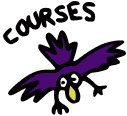To Peter Selinger's Homepage:

| Time and Location: | MWF 1-2:30 in 655 Dennison (notice there was a room change). |
| Instructor: | Peter Selinger |
| Office: 3847 East Hall | |
| Phone: 763-0292 | |
| Email: selinger@mathstat.dal.ca | |
| Office hours: Mon 3-4 in the Math Lab, Wed 3-4 in my office. | |
| Exams: | Exam I: Exam I : Wednesday February 10, 6:00-7:30 PM |
| Exam II: Wednesday March 17, 6:00-7:30 PM | |
| Final Exam: Monday April 26, 8-10 AM | |
| Grading: | Exam I : 20% |
| Exam II : 20% | |
| Final Exam : 25% | |
| Quizzes, classwork : 15% | |
| Team Homework : 20% |
There will also be two ``gateway'' tests that you will be required
to pass by
Coordinator: Toby Stafford, 3854 East Hall.
Text:
CALCULUS, Single variable, Hughes-Hallet, Gleason, et al.,
(Second Edition) and Math 116 Student Guide and (if you
wish) ``The Students Solution Manual''
Comment: It is important that you have the Second Edition of
the text book.
Calculator: TI-83 or a very closely equivalent programmable
graphing calculator.
Course Web Site: http://www.mathstat.dal.ca/~selinger/courses/116W99/ is the home page for our sections. It will contain updated information and announcements, as well as the current homework problems.
Classes: You are expected to attend every class, bringing your textbook and calculator. In class we will discuss your questions and work on some of the challenging problems together. I will do some lecturing but the emphasis will be on solving problems together, so you should read the material, think about it, and do the homework problems in preparation for class.
Homework: There will be three different types of homework: team homework, individual homework, and reading. Reading the textbook is an important part of this course.
Team homework: In the first week you will be assigned to a homework team of four or five students. Homework teams will be reassigned halfway through the semester. Usually, team homework will be due once a week; you are strongly advised NOT to wait until the last day to start working on the assignments, since they will typically be long. One complete set of solutions should be turned in for each team. It should be neat (stapled, no fringes), legible, and written in clear English. The cover sheet should contain minutes of the team meetings and the role assignments. See the Math 116 Student's Guide for more information about how you should carry out your team homework meetings, and what will be expected of you. Homework problems will be graded on a 5 point scale. Of these 5 points, 3 will be awarded for correct math and accurate calculations, and 2 will be awarded for clear explanations.
Individual homework and quizzes: In addition to your team
homework problems, you will be assigned individual homework problems
in preparation for each class. These will not be collected or graded.
However, there will be frequent quizzes based on the homework. The
quiz problems will be very similar to current homework problems, and
the best way to prepare for the quizzes is to do the homework.
Quizzes will be very short and will not be announced ahead of time. We
will aim to have on average one quiz each week, but in some weeks we
may have more or fewer. Missed quizzes cannot be made up, but your
lowest quiz score will be dropped at the end of the semester.
To Peter Selinger's Homepage:
![]()